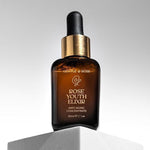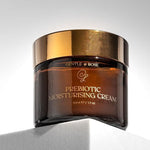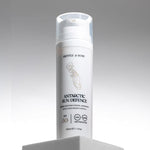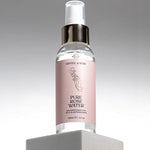Meet the natural anti-ageing hero ingredient that is taking the skincare world by storm
It's no secret that retinoids have been used to fight wrinkles for years. But now a new star has emerged on the skin-care horizon, and it’s here to stay.
Meet Bakuchiol: the natural counterpart to retinol that can help you achieve radiant, rejuvenated skin.
Many experts believe that Bakuchiol is the better, natural & vegan-friendly alternative to retinol.
Bakuchiol is just making its debut in the skincare world, but this ingredient has long been used in Ayurvedic and Chinese medicine to treat skin problems such as dermatitis, pigmentation, wounds & more.
Now, studies have confirmed its amazing results, including tackling the signs of aging.
So, let’s find out why Bakuchiol is such a great ingredient.

What’s the difference between Retinol & Bakuchiol?
To start with, Bakuchiol and retinol are structurally different.
Bakuchiol is a plant-based, natural ingredient. It’s derived from the babchi plant, known as Psoralea corylifolia that is often found in tropics and sub-tropics.
In contrast, retinol is vitamin A derivative that’s often created synthetically - some retinol products may even come from animal sources.
Bakuchiol can also be mixed with other ingredients such as AHAs and Vitamin C, unlike retinol.
When it comes to their functionality though, both of them exhibit similar effects on the skin which we will talk about next.
Anti-Aging Properties
A 2014 study found that Bakuchiol boosts the production of collagen in skin cells. Retinol and retinoids also promote the same types of collagen in the cells.
But why is collagen so important? Well, that’s because collagen is responsible for your skin looking healthy and radiant!
Increased collagen production also means improved skin elasticity and firmness.
As such, bakuchiol will help reduce the appearance of fine lines and wrinkles.
A study published in the British Journal of Dermatology in 2019 found that the 44 participants who used either a 0,5% Bakuchiol cream or a 0,5% retinol cream daily for 12 weeks, both showed equal efficacy in treating hyperpigmentation.
These results show that Bakuchiol is performing just as good in helping improve skin clarity.
Bakuchiol and Acne
Bakuchiol has anti-inflammatory and antibacterial properties, that show promising potential.
It down-regulates an enzyme that triggers excessive oil production in the skin. By normalising sebum levels, Bakuchiol prevents the growth of the acne bacteria.
Bakuchiol and Side Effects
Retinoids are known to cause side effects such as dryness, peeling and irritation. On the other hand, it was found that Bakuchiol is less likely to provoke unwanted side effects.
Even if some side effects do happen, these are often less intense compared to retinol.
Who is Bakuchiol good for?
Generally, Bakuchiol can be used by everyone, but people with sensitive skin types can benefit most.
Bakuchiol does not cause the irritation that some people experience from retinol; in fact, it has even been reported to improve conditions such as rosacea.
Additionally, if your skin is intolerant to retinol, you will definetly have more luck with Bakuchiol.
Another advantage of Bakuchiol is that unlike retinol products, it’s safe to use for pregnant women. Of course, always speak to your doctor first.
 Meteen naar de content
Meteen naar de content





